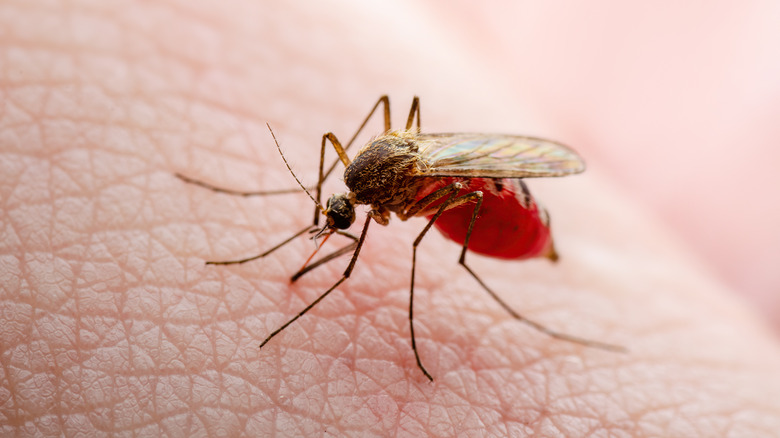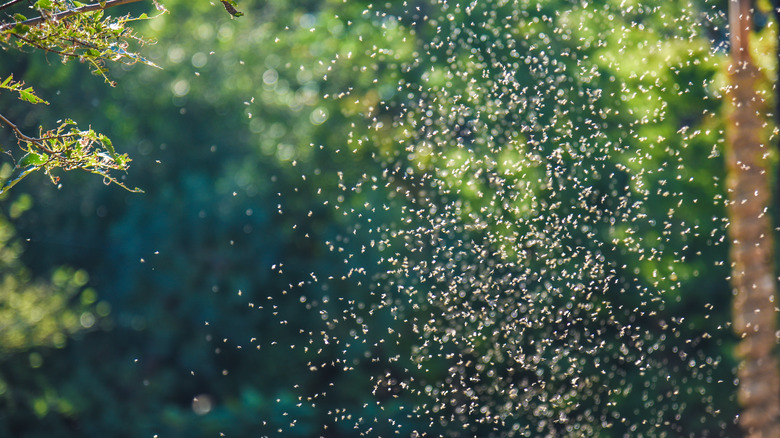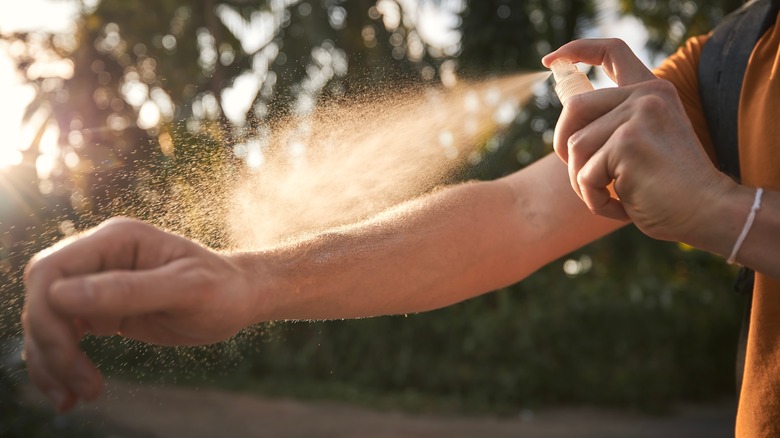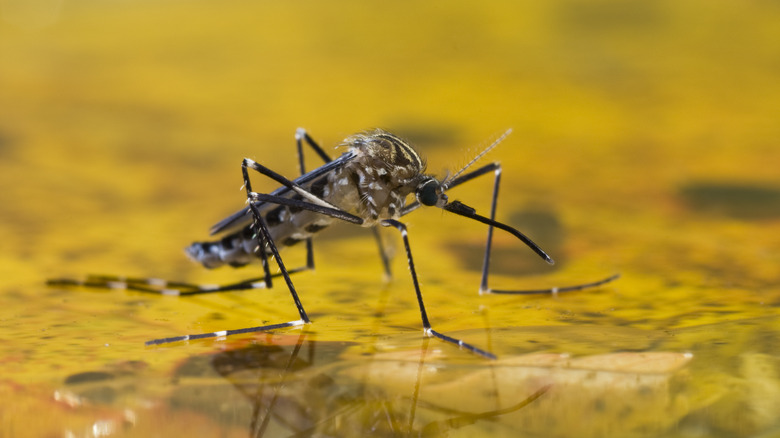Here's What Life Could Look Like If We Destroyed Mosquitos Forever
If there's one life form on Earth that almost everyone could agree needs obliterating, it's mosquitos. Even a sensitive person who gently carries insects to the window or the door to let them out of the house might unleash unrestrained fury on a mosquito if it lands on the skin. Smack, blam, dead, hooray. At minimum, everybody would be a lot less itchy and a lot happier if this scourge against sanctity didn't exist, right? This is especially true because for many people across the world, mosquitos are far worse than a mere nuisance. Malaria, Dengue, Yellow fever, the Zika virus, Chikungunya, various forms of encephalitis: mosquitos carry a host of horrific diseases.
And yet, because all facets of our global biosphere exist for a purpose, what would happen if we went all genocide on these horrible little critters? Mosquitos made the evolutionary cut at least 200 million years ago and are pollinators, like bees. Blood is actually their secondary food source, and only for females when they lay eggs. Some animals like bats, birds, and frogs eat mosquitos but don't rely on them solely for sustenance. So, would there be any terrible ecological fallout if all mosquitos everywhere died all at once? Truthfully, not too much. But given that there are 3,500 species of mosquito in the world, and an estimated 110 trillion of them alive – yes, trillion — this might not be such an easy task. But before thinking of "Can we do it?," we should answer, "Should we do it?"
The danger from mosquitos
Is there any other reason to consider annihilating all mosquitos everywhere aside from how their proboscis leaves behind saliva in your skin that makes it irritated and itchy? Well, yes. Mosquitos are vectors (carriers) of dastardly, devious, and deadly diseases — the kind that makes up 17% of diseases across the world and account for more than 700,000 deaths every year. Protective mosquito nets are so common and crucially life-saving in some parts of the world that organizations like The RBM Partnership to End Malaria have shipped two billion of them since 2004. Such nets account for stopping 68% of the cases of malaria across Africa over that time.
And malaria — a fever-causing, potentially fatal disease diagnosed nearly 250 million times each year — is just one disease that mosquitos carry. Dengue is another viral infection that mosquitos carry that gets diagnosed 390 million times every year and can, at worst, cause intense headaches, joint and abdominal pain, vomiting, and more. Yellow fever causes jaundice, and the West Nile virus can cause encephalitis — swelling of the brain. The Zika virus, meanwhile, can cause nothing more than rashes in some and birth defects like microcephaly (having a small head) in others. And this isn't nearly a comprehensive list, either. Basically, mosquitos are far more dangerous in many parts of the world than merely being backyard pests. As swarming vectors of life-threatening diseases, why not assassinate them all?
The mosquito reproductive cycle
If we ever really intended to eradicate mosquitoes, we'd have to understand and intercept the mosquito life cycle. That life cycle lasts from as little as four days up to a month, but that's plenty of time for mosquitos to breed and each female to lay up to 250 eggs at a time. Eggs can hatch into larvae within 24 to 48 hours, and those larvae pupate into adults that fly around, breed, and repeat the same cycle. The whole thing is dependent on one, single, critical type of habitat: standing water and related dank, unclean surfaces like gutters, air conditioner drip trays, tires hanging around the yard, rotting tree stumps, etc.
Mosquitos, in other words, live life in two phases: waterbound and airborne. The airborne, adult variety is the kind that everyone knows and hates — at least for mosquito females. Females lay eggs in locations that provide nutrients to their young, but they still need supplemental nutrition in the form of blood to produce eggs. Any old blood will do, even reptilian, but we humans are certainly big, vulnerable, relatively slow creatures without a lot of fur shielding our vulnerable skin from punctures. And while mosquitos aren't the most hardy of bugs and die pretty easily, they aren't always the easiest to swat, smack, crush, etc. — as we all know. They land on the skin, inject their proboscis — a built-in straw, basically — and their saliva passes into the skin as they suck up blood. Bam: instant nemesis.
Can we do it?
There are small-scale ways to reduce the quantity of mosquitos in your own life, like keeping your house and property clean and free of standing water — including in things like old buckets, using pesticides, throwing away old junk and not leaving it outside, and other common sense items. The same things can be done on a neighborhood or municipal scale, like keeping garbage dumpsters and gutters clean. None of these measures will eradicate mosquitos, however — they'll just reduce the palatability of certain areas as breeding grounds.
But, how about at a worldwide scale? One of those more promising extinction methods — if we can call such a thing promising — is the introduction of genetically modified, sterile males into the environment. As Target Malaria describes, more sterile males released into the environment means more unsuccessful breeding attempts and less mosquitos overall. Keele University also says that such sterility measures make males less mobile and reduce their lifespans, which has already happened in areas vulnerable to malaria. This is considered by locals a huge win.
Beyond such hi-tech extermination methods, we've got the tried-and-true introduction of predators into certain environments. A single hungry bat, for instance, can consume up to 1,200 mosquitos in an hour. Provided we all don't mind living in batland, and bats continue to prefer mosquitos over other food, and mosquitos don't select for clever bat-avoidant behavior, and a hundred other uncontrollable factors, we just might be able to make a dent in mosquito numbers. This is especially true when using predators in tandem with other extermination methods.
Should we do it?
And now we come to the big question that's been looming over this entire article: If we could eradicate mosquitos from existence — pluck them off the evolutionary map and flick them into oblivion — should we do it? If we truly want to behave in an ethical way towards all forms of lives, even the unpleasant ones, then it's important to remember that we're essentially talking about what biologist Olivia Judson described in The New York Times as a "specicide." Put differently: Would we be having this discussion if mosquitoes were cute and cuddly mammals?
For those for whom mosquitos are a real, existential threat the solution is likely obvious: kill them all. If not, reduce their numbers dramatically, as happened when sterile males released into the environment in the disease-vulnerable Cayman Islands reduced the mosquito population by 96%. After all, few species are so ecologically critical that their destruction would signal an unrecoverable loss to the environment. Or as biologist Olivia Judson says, "We're not left with a wasteland every time a species vanishes."
On the other hand, we've got all the familiar arguments about food webs, the interconnectedness of each species to each other, unforeseen and unplanned consequences if we tamper with nature, etc. But as the European Commission points out, it's not so much macro-level biomes we'd have to worry about when it comes to the eradication of mosquitos, but microbiomes, e.g., the interaction between mosquito larvae and single-celled organisms in mosquito breeding sites. It's still possible that mosquitos perform some role that we don't know about.
A world without mosquitos
So based on everything we've talked about, what would a world without mosquitos look like? For those in areas affected by mosquito-delivered diseases like Dengue or Yellow fever, life would be a whole lot less fraught and a whole lot more happy and healthy. And the mosquito net industry would be out of work — no biggie. For everyone else, there'd be a whole lot less annoyances and a whole lot less calamine lotion smeared on mosquito-punctured skin. So all in all, looking only at the quality of human life, a mosquito-less Earth would make everyone's better.
At least, it seems so. On the other side, we've got plenty of "pull on one thread and the whole thing unravels" arguments, as sites like Forest Preserve District County and Purdue University describe. In a general sense, such statements are true for any ecosystem. Those statements are also much more apparent for lifeforms like large, attention-grabbing apex predators than they are for creatures like the humble earthworm — or the mosquito. And yet, despite such arguments, there's no indication at present that mosquitos are actually super critical to Earth's entire web of life. They pollinate like bees, but not as much. They're food for certain creatures, but not solely. They interact with microbiomes — but in not-fully-known ways.
So what would life look like without mosquitos? It'd be a bit of a gamble, but we just might be able to find out.





